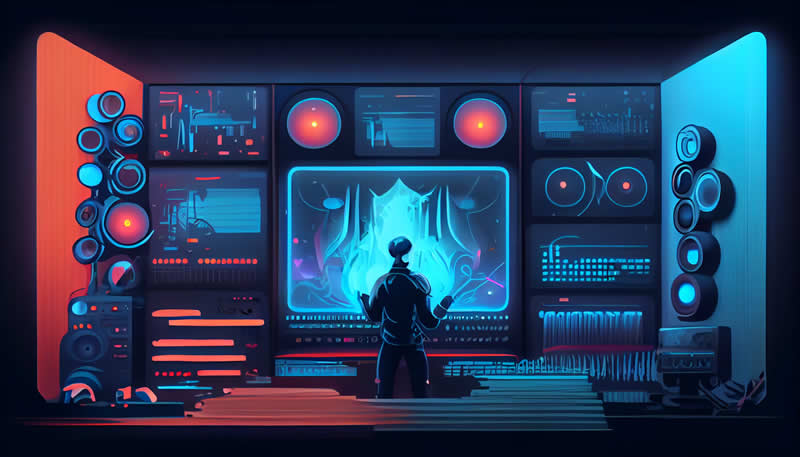What is a music arranger? Role and competences
An expert who collaborates closely with other musicians to construct, modify, and produce musical pieces is known as a music arranger. By adjusting the speed, instruments, harmonies, and melodies, they can change the composition's atmosphere and tone.
Finding out more about what a music arranger does can be helpful if you're interested in pursuing this career.
This article explains what is a music arranger, describes what they do, lists the key competencies they must possess, and talks about their education and training. Let’s dig into it!
What is a music arranger?
An artist that organizes and revises musical compositions for use by producers, directors, conductors, and performers is known as a music arranger.

Usually, they improve on already existing works, modifying them to fit a new purpose or situation and rearranging them to work well with various instruments or bands.
To ensure that musicians know how to execute the piece, music arrangers can modify the music and collaborate closely with musicians.
What does a music arranger do?
Adapt song harmonies and melodies
A music arranger may change the harmonies and melodies to alter the atmosphere and tone of a piece in order to make it work inside a performance, film, or other production.
For instance, a music arranger might change a well-known song by slowing it down for a depressing movie scenario.
Utilize technology when creating and arranging
Technology plays a significant role in music arranging since it enables the professional to independently produce tracks, arrange new music, and manipulate existing ones.

Using musical software, an arranger can test different sounds and decide which one works best for a new arrangement.
Edit and revise content to get the best results
The music arranger may add or remove vocal files, switch instruments, and adjust the speed of a song as part of the editing and review processes.
Try different musical genres, instruments, and sounds
To experiment with music and produce new sounds, music arrangers may employ instruments or musical software. By experimenting with various methods, they can contribute to musical trends and enhance their musical skills.
Incorporate musical notation on compositions
An arranger can use software or pen and paper to translate musical compositions into notation that other musicians and performers can read when they have an idea for a new composition or want to transpose an old one.
Essential abilities for music arrangers
Be patience
The first time an arranger works with a piece of music, it might not be flawless. To create a final product that satisfies a client or sounds as well as it can, it may occasionally take multiple iterations of experimenting and editing.
This indicates that the capacity to wait patiently or concentrate on a task while remaining calm is a crucial trait for music arrangers to possess.
Even in the face of unpleasant circumstances, they are able to communicate clearly with other musicians and songwriters because of their patience.

Time management
Many clients that commission musicians to arrange their music have strict deadlines. This is particularly valid for music arrangers who add to the soundtracks of movies and television programs.
The music arranger must provide their work to the team in order for them to incorporate it into their project because the movies and television programs must premiere by a specific date.
Time management is a talent that enables music arrangers to set priorities and carry out their obligations, which can increase the pleasure of their clients.
Technical ability
Many music arrangers can alter and revise their songs using musical software and arrangement applications. This implies that they can electronically alter the sound to choose the most effective way to execute the composition.
Technical competence is crucial since an arranger must be able to perform several fundamental computer tasks, such as communicating and working online with other musicians.
They might also need to know how to use complex music production and software tools.

Critical thinking
The ability to recognize a problem, evaluate the information surrounding it, and provide workable solutions is known as critical thinking. This is a crucial ability for arrangers to have because there are many issues with arrangements that aren't immediately apparent, and the arranger needs to be able to identify them.
What may enhance an arrangement and support the performers in performing at their best is identifying these tiny faults and fixing them. When collaborating with other musicians to resolve communication and collaboration challenges, arrangers may also need to utilize critical thinking.
Creativity
It takes creativity for arrangers to come up with new concepts and make original compositions or arrangements.
They frequently have the ability to envision how a work may be enhanced, and they sometimes have an innate understanding of the musical choices that might elevate an arrangement.
Many arrangers develop their creative skills by studying many artistic mediums, looking for inspiration, and experimenting with novel sounds.

Musical talent
To help performers achieve the ideal sound, music arrangers frequently collaborate with a variety of musicians and performing groups. This implies that music arrangers need to have a deep understanding of how various song elements work together.
A music arranger's work can be improved by having proficiency on a variety of instruments and in singing since it allows them to experiment with sound and comprehend the musicians playing their works.
Some arrangers pursue formal education to increase their knowledge of musical theory and proficiency with a variety of instruments.
Music arranger' education and training
Instrument expertise
Many young music arrangers start taking lessons or participating in band programs at their schools to learn how to play instruments.
They can enhance their abilities by learning the fundamentals of how musical instruments work and how to play a variety of instruments.

Because of their prior knowledge, many music arrangers can play many instruments and pick up new ones rapidly.
Academic training
Even though it is not necessary to have a formal degree to become a music arranger, doing so can help you improve your abilities.
Music arrangers can improve their comprehension of how various elements within arrangements function by studying the advanced fundamentals of music theory in formal music education.
Many music arrangers can build the professional and industry network necessary for landing a job or clients by finishing a formal degree.
Industry knowledge
Through internships and apprenticeships with music production businesses or stage crews, a music arranger might gain experience.
An arranger may continue working for a production company after finishing their initial training before transitioning to television or movies.
An arranger develops their skills further and may start practicing independently as they complete more tasks and arrangements.
Music arranger vs producer
Even though they frequently work together, composers and arrangers sometimes have very different daily tasks.
A composer uses instruments or computer programs to create creative music that will be performed by bands, orchestras, or other musical organizations.
An arranger transforms previously composed music by a composer into something entirely new.
When it comes to the larger picture, producers and arrangers work differently. The arranger can assist with music arrangements for a variety of purposes, such as live performances, records, and even multiple instruments, but that's about where it ends.
A producer will have the final say over the song's arrangement and, ultimately, will have the final say on everything. They employ anyone who is required for a project, which inevitably includes arrangers, authors, musicians, etc.

What is a music arranger - Conclusion
The technical abilities required for musical arrangement are definitely learnable. However, you need to have a solid background in music theory and instrumentation if you want to become a successful, in-demand music arranger.
The more instruments and genres you are familiar with, the better.
We hope you enjoyed reading this post, and if you'd want more career-related guidance, on our blog section, there are many more beneficial articles, advice, and recommendations to be found.
You are undoubtedly here because you love music, so please take advantage of the chance to listen to it while interacting with other users via webcam in CalypsoRoom.
In CalypsoRoom we believe music is the most powerful tool to bring people together, and that’s why we created a safe digital music social network online where you can meet friends or new people starting from the same song, listening to the music simultaneously connected by webcam.
Are you a music artist or label and do you want to give your music a further dimension? Do you own or co-own the master and publishing rights to your music? Consider to post it on CalypsoRoom listening to it together with your super fans, at the same time, connected by webcams.
Thanks for reading,
CalypsoRoom Team
back
Written by CalypsoRoom Editorial Team
The CalypsoRoom Editorial Team is a skilled and diverse group of writers, researchers, and industry specialists who have access to Calypso's data and information in order to give you broad knowledge about the music industry as well as helpful advice to help you manage your music and dancing career.
Updated January 2023
Company number: 681223
James's Walk 31, Dublin, Ireland
contact@calypsoroom.com
+353 (89) 435 8928





